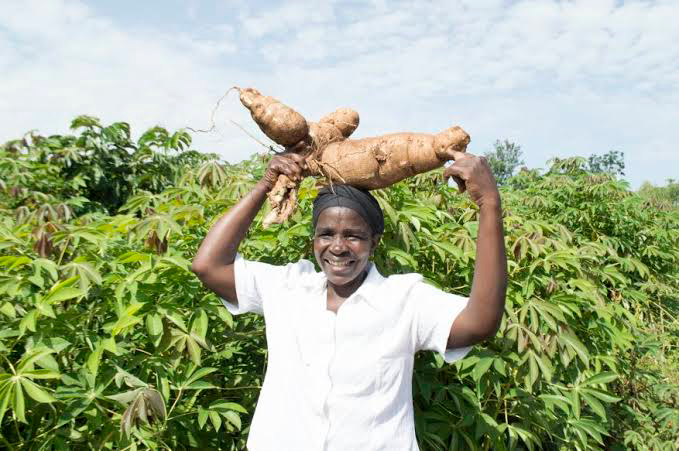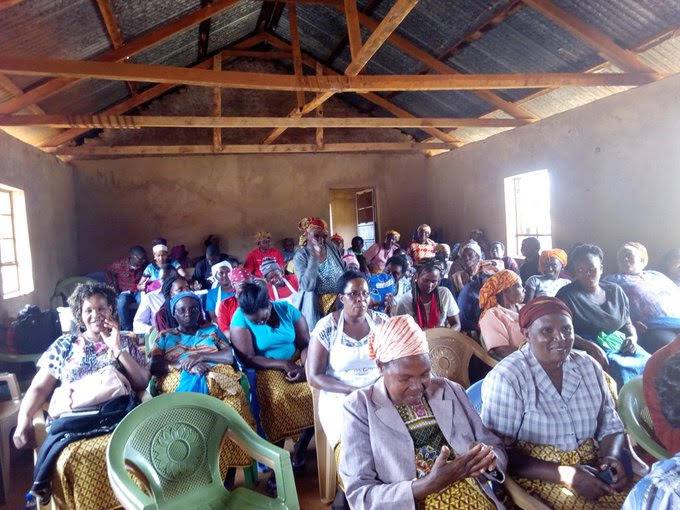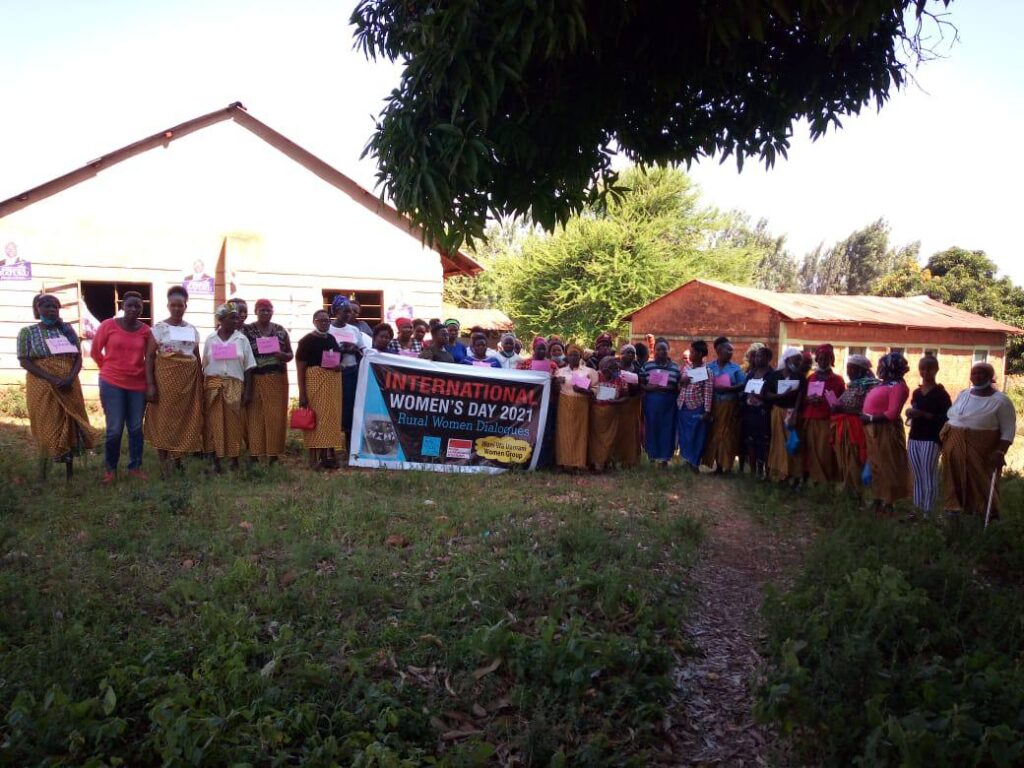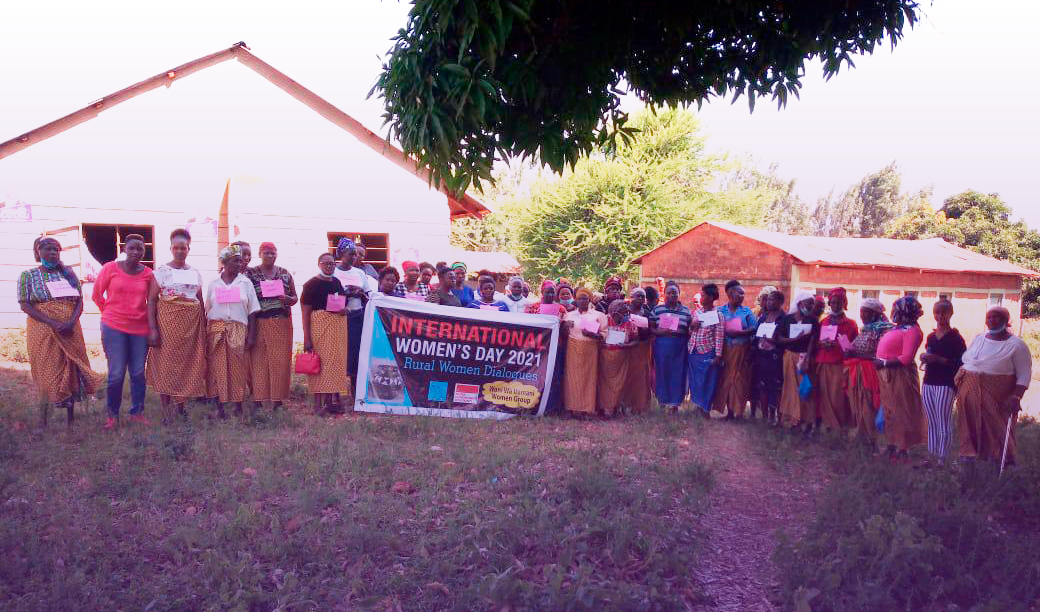Agriculture is the backbone of Kenya’s economy, with rural women accounting for the bulk of food producers and agricultural workers in the country. The agricultural sector directly contributes to about 26% of Kenya’s Gross Domestic Product (GDP) annually, and to further 27% through manufacturing; distribution and service sectors account for 65% of the country’s total export earnings. The sector employs over 80% of Kenya’s rural workforce and provides more than 18% of formal employment. The crops, livestock, and fisheries sub-sectors are the main components of the agricultural industry. The crops grown in Africa include maize, beans, finger millet, and sorghum. African indigenous seeds include teff from Ethiopia, finger millet, sorghum, and cassava tubers.
Women suffer from overwork, taking up care roles in the household as well as productive roles on the farm or agriculture labourforce. They lack access to credit. When they want to expand production, women do not have collateral to get loans from banks. This is because title deeds to land are often in the hands of men (either as husbands or adult sons). Women are affected by patriarchy and do not have a voice when it comes to productive resources such as land and livestock. At the household level, crops are even divided into male crops and female crops. Male crops are cash crops, with which families earn money, including livestock such as cattle, whereas females crops are subsistence crops such as maize, beans, and chicken.
Women suffer from exposure to agrochemicals because many are migrant workers in plantations. This has health implications; for example, respiratory diseases and back problems. They also suffer from seasonality of work. Some only get work to do during harvesting or planting, while the rest of the year they do not have jobs or stable incomes. Women are the ones responsible for cooking food in their homes and, when there are food shortages, they suffer from hunger. They also suffer from lack of information about market trends, exploitation by middlemen, and lack of skills in value addition of their produce. Women also suffer from lack of storage facilities to preserve farm produce, thus incurring losses when there is bumper harvest because of crops rotting.
Our project exists to provide women with better conditions of work. On food issues and climate justice, we do political and technical education on the entire food production process. From preparing the soil to the post-harvest. We hold sessions within our farmers’ homesteads, bringing farmers together. We discuss why our soil is losing fertility, for how long the farmer was using that soil. Prior to the use of chemicals, they had good ways of taking care of the soil. They were not poisoning the soil and spending money on it. Now they have to spend a lot of money if they want to expand food production. We also do soil testing to check the amount of nutrients each farmer’s soil has, and which types of crops that soil can grow, and we train farmers on how to compost.

Fighting Corporate Power, Toward Seed Sovereignty
We discuss indigenous seeds with farmers. We found out that indigenous seeds are more resistant to climate change. We talk about caring for the crops and the dangers of pesticides for the environment and as well as humans. We address discussions around Monsanto and cases that we are seeing in the United States, and the negative impacts of the use of chemicals on health. We are looking for alternatives. For example, biofertilisers such as the extracts from the neem tree.
Seed justice and seed sovereignty is about going to communities to raise awareness of the importance of using indigenous seeds. What is happening in the African context is that international corporations are going and selling their products even to the most remote villages. Transnational corporations have infiltrated the continent and this is problematic because agriculture is a source of income and livelihood for so many people.
In Burkina Faso, Nigeria, and Kenya, they recently approved a genetically modified cassava. Cassava is a very important food for our culture as a staple, but now, with this GM version of it, thousands of Kenyans are going to be affected. And we know that they started with cassava and that later they will search for another product. We need policies and legislation that support Farmer-Managed Seed Systems. What we have now are policies that criminalize farmers that grow indigenous crops.
Here in Kenya, we have regulations around food such as the Irish Potato Regulation, which says that, if you want to grow this food, you need to register with the government. If you are not registered and are found producing Irish potatoes, you can get arrested. And, of course, when you register, you have to pay a fee every year, and many farmers cannot afford that.
One of these crop legislations is the Seeds and Plant Varieties Act, also based on farmers registration. Non-registered farmers cannot get into the government systems. This is all about creating a conducive environment for international corporations, because this way they are able to know, with these systems, how many farmers there are in a village. This also represents the push for farming without people, with technology. It gets easier for transnationals to market their products.
Precision farming is an example of farming without farmers. This is because of the interaction of technology with the farm to collect information such as soil humidity, satellite data, assessing crop deficiency. Farmers have a physical relationship with land, and replacing farming with machines means that farmers have to spend more on food production or it will only serve the interests of large scale producers. With such technology, there will be more land grabs or farmers will be forced to consolidate their land to make it bigger to enable mechanization. Some farmers will end up selling off their land.
A push for harmonization on legislation related to seeds is happening now, at the African Union level and at the COMESA level (Common Market for Eastern and Southern Africa) through the COMSHIP Plan[1]. The main objective is to develop continental guidelines for the harmonization of seed policies and legal frameworks including variety testing and release, seed certification and quality assurance, digitalized documentations, phytosanitary measures, and plant variety protection/intellectual property rights.
The voices of farmers, which are actually the ones feeding the world, are not being considered in these discussions. Additionally, harmonization means that they will only recognize conventional seeds, which belong to transnational corporations. And, of course, with the push for registration of farmers, it means that these companies want to get a list of their potential markets. All this is making farming and food more expensive.
The free trade agreement is a pact between two or more nations to reduce barriers to imports and exports among them. An example of an FTA is the Kenya-USA Free Trade Agreement, which uses the United States–Mexico–Canada Agreement (USMCA) as its organizing framework. The implications of it are terrible to farmers. In Ghana, prior to the dumping of European chicken, local farmers were breeding these animals and the country was chicken sustainable. With the opening up of the market, these products found a way into Ghana, and that changed the preferences of the population. This has really destroyed the local economy.
In Kenya, we used to have a very strong cotton industry. It was a source of income not only to all producers and farmers, but also to tailors, seamstresses. With the market liberalization and industrial control, secondhand clothes from different parts of the world have been dumped into the country. So, instead of buying clothes made in Kenya, people can go to the Gikomba market and buy something for much less money. Now the cotton industry is not so strong and the people who used to work in it have been laid off.

Fighting Neocolonialism
The majority of those who are growing food are women, the ones who are keeping the seeds are women. An online campaign connecting Africa and the diaspora was created, named Seed Is Power Rally, organized by the Alliance for Food Sovereignty in Africa (AFSA). Its goal was to honor African seeds, celebrate the work of farmers, and get people united for seed sovereignty. Seeds are a subject that we can link to slavery. When our ancestors were being taken away, they hid seeds in their hair. Seed is power and resistance! It should be shared and saved. Our struggle is all about the fight against the corporatization of African seeds. Also, regarding chemicals, Africa has been used as an offloading site. Chemicals that are not allowed in other parts of the world are being sold and used in Africa’s fields.
In 2016, there was a conference from the World March of Women (WMW) and we had representation coming from a lot of different countries. At this conference, I talked about genetically modified seeds and people shared that it was also happening in their countries. When farmers use genetically modified seeds, they become linked to the company that creates them every season. It’s all about cooperative consumption. They know that if the farmer has their own seed, they won’t need to go to agrovets.
Transnational companies who are producing these seeds are also producing the chemicals that will be used on the crops. Their goal is to make money, no matter how. There is a greater danger with the elements of geoengineering, with gene editing. This will eventually have implications for biodiversity and, of course, there is a direct connection with diseases like COVID-19. Besides that, there is the emergence of issues around mutations. People are taking medicines and no longer working. Within the African continent, we have the challenge of desertification and other problems related to issues around climate change.
Transnational companies come to the communities, take their seed, transform them into something else allegedly better, then come back to the communities to sell them. They charge more for these seeds and this extra fee is transferred to the consumers and buyers, who will pay more for the food they already had. Farmers in Africa are not insured. If they buy seeds and the seeds don’t grow, nobody is going to pay them anything, as opposed to what happens in Europe and in other developed nations, where farmers are subsidized.
Building Alternatives
In Kenya, we have a Constitution that talks about gender equality in terms of access to resources, but in reality this does not happen. Only 5% of land in Kenya is jointly owned. Only 1% of the land is owned by women. That’s how oppressed women are.
Women are the majority of the custodians of seed. There is a push for the use of hybrid seeds, so we train communities to use indigenous seeds. That is how we work for alternatives. In a place called Machakos, we are having a seeds and crops dialogue called tafakari, which is a Kiswahili[2] term for reflection. There, they are telling us that they go to their local agro store to buy seeds and they are told that, if the seeds don’t germinate in three weeks, they have to call a number. It works like this in an entire village. One of the women from the group said that her crops didn’t germinate, and when she called, the response she had was that the mobile operator could not be reached.
In Africa, the work on land is done by family. They can get local assistance with the tilling of the land, but that is not for free. In some areas, this extra help can be very expensive. What happens in this scenario is that losses of crops mean more work. And, of course, there is the issue of irrigation, which is not abundant. Most people rely on the rains. So if your seeds don’t grow, you won’t have any crops to harvest. Your family is going to go hungry, because people depend entirely on that day-to-day farming.
There is a lot of demonizing around indigenous seeds. People are told that these seeds are not going to thrive. They look at food from an economic perspective. Indigenous food and seeds are cultural—they have environmental benefits, they are more nutritious. If you talk to the elderly, they will tell you how to get healthy only by eating some sort of indigenous food. But now this type of farming is categorized as an informal occupation. It doesn’t even have any recognition.
If you look at agriculture, it is an elderly people thing in Africa. Young people don’t want to get their hands dirty with food production, but they are the majority of consumers. What we do at the organization level is that we help these youth learn more about food production and agriculture. We teach them about the food they eat and where it comes from, and we organize exposure visits to rural areas to allow them to understand the struggles of farming communities. What seed sovereignty has been able to do with the World March of Women is to organize discussions about the subject and talk about alternatives.

[1] COMSHIP – COMESA Seed Harmonization Implementation Plan.
[2] Kiswahili, also known as Swahili, is a Bantu language and the native language of the Waswahili, or Swahili people. It is a lingua franca of the African Great Lakes region and other parts of East and Southern Africa.
Leonida Odongo is a social justice activist dealing with issues around food and climate justice from Nairobi, Kenya. She is part of the World March of Women and the Shrinking Civic Spaces project.




